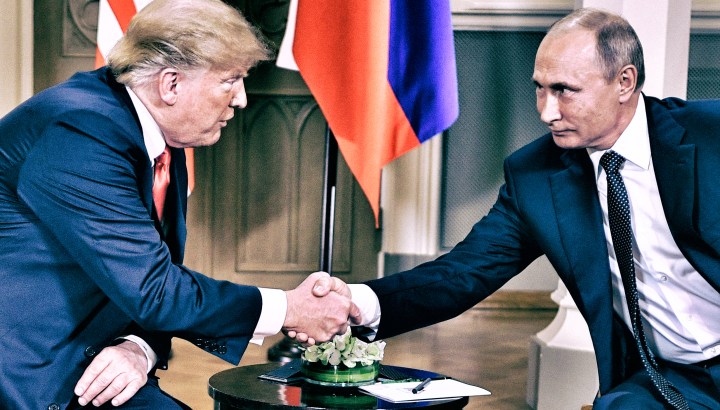THE WORLD IN 2019
Into the Unknown as Identity confronts Power on a damaged Earth

Get ready for a really bumpy ride in 2019, as political, economic and social pressures are on the rise.
In 1992, as the Cold War between the United States and the Soviet Union came to an end with the tearing down of the Berlin Wall that had divided that city (and thus Germany as a whole), the collapse of the Soviet imperium in Eastern Europe, and then the very dissolution of the Soviet Union itself, Francis Fukuyama had written a book entitled The End of History and the Last Man.
Fukuyama’s book’s title made a powerful allusion to Frederick Nietzsche’s Thus Spake Zarathustra and the potential for the benign rule of a society where humanity lives in peace, in harmony (even if it would be a bit boring). Fukuyama argued that, rather than Marx’s inevitable transformation of capitalism into socialism or communism (or was that supposed to be vice versa?), from now on, things were going to be very different.
Or, as Fukuyama had written:
“What we may be witnessing is not just the end of the Cold War, or the passing of a particular period of post-war history, but the end of history as such: that is, the end point of mankind’s ideological evolution and the universalisation of Western liberal democracy as the final form of human government.”
Popularised (or perhaps bastardised), Fukuyama’s thesis led to a form of triumphalism in Western capitals and among elites that Western-style liberal, rules-based economics and representative democracy was now on its inevitable march towards global acceptance and warm embrace. The new Russia had shucked off its outmoded economic authoritarianism and was – bumpily, to be sure – now headed the right way. Concurrently, the new China, happily in thrall to Deng Xiaoping’s maxim, “To be rich is glorious”, was similarly on the right track, becoming a vast nation of “Crazy Rich Asians”.
As part of this, we were now living in what was a unipolar world; that amid much cheering and whistling (but not by absolutely everyone, everywhere), the American-led globe was coming into focus – a secular version of “God’s in his heaven, all’s right with the world”. Pretty much everything else on the remaining “to-do list” of world problems was the tidying up of a few miscellaneous, albeit troublesome, bits around the world in some odd, retrograde corners.
Now, with more than two decades of hindsight, it is possible to argue that in the hands of President George HW Bush, the implications of the Fukuyama thesis had led to a UN-sanctioned, limited effort to solve one of those messy bits by expelling Saddam Hussein’s troops from their illegal occupation of Kuwait – but, crucially, not marching into Baghdad to carry out a real regime change exercise there. This demonstrated that the emerging global order had both steel teeth and a sophisticated understanding of how to deal with the bullies, bad boys, and miscellaneous troublemakers.
That president’s son and then president in the 2000s, George W Bush, with the encouragement of advisers who had apparently imbibed Fukuyama’s heady liquor but without reading any of the cautionary warning labels, took up a dubious claim about those weapons of mass destruction and thereby embarked on a successful invasion but a much less than stellar occupation of Iraq. And now, after more than a decade of American military engagement in three nations, it is without an easy path out of them – without allowing things to become even worse than they already appear to be. That unthinking engagement, in turn, helped unleash a trans-national wave of religiously-grounded terror that plagues us now, but simultaneously seems impossible to bring to an end.
Along the way, other developments also seem to have overtaken that Fukuyama-esque vision. Now ushered fully into the global trading system, Chinese energy and drive have created an alternative to that democratic/liberal economic “end of history”. Harnessing public and private capital – together with political emasculation for a billion-plus people but some serious long-term planning – it is delivering real growth and economic benefits to many hundreds of millions, and it seems to be offering an increasingly attractive option to many non-Chinese nations around the globe as well.
The Russians, meanwhile, have a leader who continues to believe that the break-up of the Soviet Union was the most horrific event of the 20th century and that it is his heaven-sent mission to address this problem. That state is now focusing on a reassertion of its influence in Europe through soft (and hard) pressure on the states of its “near abroad” such as Ukraine, and the blandishments of plentiful natural gas to nations such as Germany. But, most especially, in the Near East, it has made a major commitment of military power in Syria to re-establish its heft in the region as the go-to power.
Now, 2019 has already brought us a world where, on the one hand, Venezuela’s corrupt, incompetent leftist government of Nicolas Maduro has bankrupted a nation that holds one of the world’s largest petroleum reserves. And on the other, Latin America’s largest nation has cast aside a period of disorderly but democratic turmoil to elect someone – Jair Bolsonaro – whose politics are firmly modelled in the style of people like the Philippines’ Rodrigo Duterte, Hungary’s Jerzy Orbán, and Donald Trump. A bit later on in the year, 2019 also brings the world’s largest democracy, India, into a general election to determine if that nation wishes to continue the leadership of Narendra Modi, a man who is frequently criticised as an angry, ethnically based politician somewhat in the manner of America’s Donald Trump.
It may be useful to remember that the year after Fukuyama’s book, the late Samuel Huntington (Fukuyama’s academic mentor, just by the way) issued his own very different version of the future, in his widely read essay in “Foreign Affairs”, entitled The Clash of Civilisations. A few years later, he expanded that into a full-length book. Huntington argued that in the future, there would still be wars, but they would increasingly be fought not between countries, but between cultures, or “civilisations”. Among other predictions, Huntington argued that Islamic extremism would become the biggest threat to world peace in the years ahead. Pooh-poohed by many as a misanthropic, cynical reading of the future, at variance with the afterglow of the emergence of a liberal democratic world that was obvious to anyone with eyes, somehow, Huntington’s darker vision now seems rather closer to the truth than Fukuyama’s own rosy view.
In fact, in the past year, Fukuyama issued a new book, this time around positing identity (and the resentment it both helps breed and feeds on further) as the key driver in the politics of our current world. Donald Trump’s victory in 2016, the angry push for a Brexit in the UK, the rise of Germany’s Alternative for Germany party, the populist victory in Italy, Bolsonaro’s Brazilian victory, and the sudden rise of the yellow vests in France would all seem to be assorted manifestations of the power of identity to overturn politics-as-usual and to force a recognition of deep economic disparities. This has been true, even as these draw their power from among the ranks of those who feel ignored, snubbed, slighted, and overtaken by the globalist swells and prophets (along with the advocates of some more favoured identity groups), rather than from among the ranks of the deeply poor in their respective nations.
And so we now have a world in 2019 that is a very far cry from the vision set out by Francis Fukuyama in those heady days after the end of the Cold War. Aided and abetted by a raging, ignorant, incoherent American president, the unity of the West has been fractured, right along with angry trade disputes with most of America’s allies and neighbours, as well as leading partners such as China.
The European community of nations is in the midst of leadership challenges in most of its leading nations – as Europeans themselves now seem to doubt the inevitability that their community will go from strength to more strength in the years to come. And in the Near East, between the incompetence and incoherence of American leaders and policymakers, the eagerness for influence on the part of the Russians, and the struggle for leadership and/or military dominance being played out between Iran, Saudi Arabia, Turkey, Israel, the sum of these may guarantee that future upheavals will spill over elsewhere – or be unable to be restrained.
Underneath all of these more immediate issues are some still-bigger ones. First is the continuing and perhaps unstoppable flow of economic, social and political refugees from Africa, Asia, and Latin America to safer, richer places. Then there is the ever-more-pressing immediacy of a need for global action to hold back or even to try to rewind global climate change before the Earth suffers irrevocable harms and we look more closely at the planet Venus to see what is the next stage for our own planet. But there is also the need to find ways to accommodate the next industrial revolution, even as it offers great benefits but simultaneously threatens to eliminate millions of more routine, menial jobs, just as the world’s aspiring middle classes clamour for employment and the access to incomes that could move hundreds of millions of the poor into their respective national middle classes.
This time around we shall forego predicting that 2019 will be the year medical and scientific advances deliver revolutionary ways to deal with diseases such as cancer (although they may well, given the rapidity and success of research at the molecular and genetic levels). We will also put aside thinking about the possibility that new developments in energy technology will mean a real spurt of cheap, efficient, clean solar energy to power a growing amount of the globe’s energy consumption (although that is increasingly likely too), along with the revolutionary changes this will have on just about everything – and everybody.
Instead, here are a few less than long-term thoughts. First, the globe is about to enter a gradual slide into a period of economic stumbles. This is not good news for most everyone, but the rolling effects of the US-China trade war and China’s own (largely hidden but very real) debt overhang probably guarantee economic rough sailing. All sustained economic booms eventually come to a bump in the road and 2019 may well be the year our current run does.
Further, we shall see increasingly political unrest in many nations around the world as a result of this economic reality – and maybe a small war or two as well. Elections will deliver candidates who promise much and who can deliver much less, to the quick unhappiness of populations around the globe.
Then we must expect that this year’s weather will deliver disasters – typhoons, hurricanes and cyclonic storms of great strength and destructive capability, or droughts, blizzards, or great monsoon-driven flooding. And such events will provide continuing evidence of the world’s inability to cope easily with such disruptions, harbingers of even less capability in the face of climate change-driven hard going.
But here is one prediction – or at least a thought – that could be really amazing. While no one expects that the Chinese lander on the far side of the Moon will reveal a black, vibrating obelisk in the manner of Stanley Kubrick and Arthur C Clarke’s 2001 Space Odyssey/The Sentinel, what if the newest Martian lander, InSight, in the course of its digging into the planet’s soil, discovers something that is a very clear indication of life?
What would that do for humanity’s understanding of its place in the universe, for religion, and even for business?
In the 19th century, it was said that the effect of Marx, Freud, and Darwin had forever changed how humanity viewed itself – and Einstein’s ideas finished the task big time.
Now, if we learn we truly are not alone and that we have no claims to uniqueness, what then? Would this change how we treat this planet we are on, or get on with the business of laying claim to Mars as a Plan B if we really mess this one up? DM



















